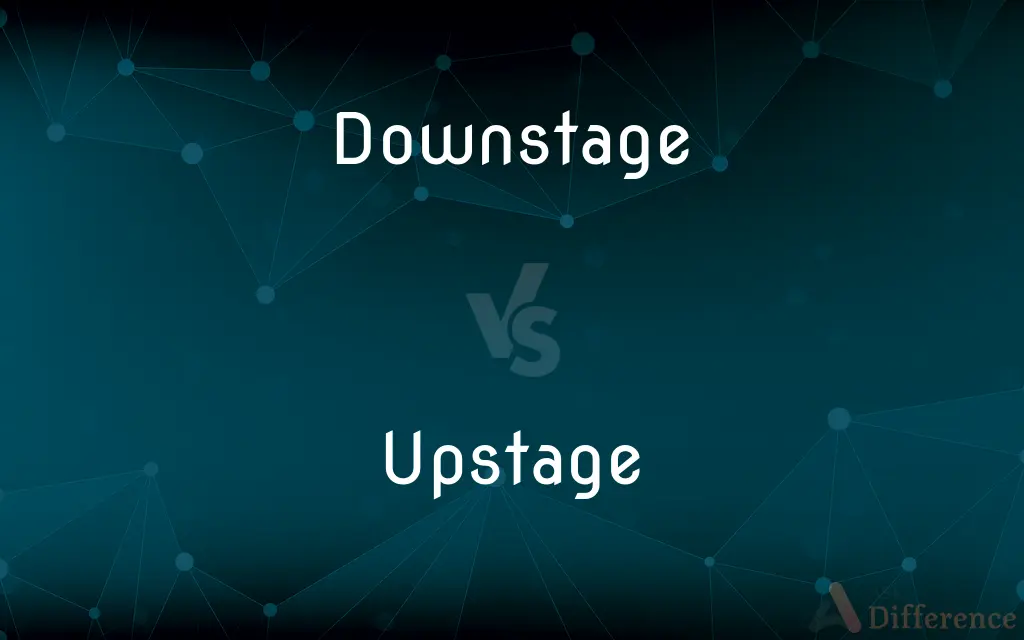Downstage vs. Upstage — What's the Difference?
By Tayyaba Rehman — Updated on November 1, 2023
Downstage refers to the front part of a stage, closer to the audience, while Upstage is the rear part, further from the audience.

Difference Between Downstage and Upstage
Table of Contents
ADVERTISEMENT
Key Differences
In the realm of theater, Downstage is a term originating from the slope of early stages; as stages used to be slanted with the lower part towards the audience, this section was termed Downstage. Upstage, on the other hand, was the higher section, further from those watching, and away from the main view.
Downstage not only denotes physical positioning but also has implications for an actor's performance. When a performer moves Downstage, they are in a prime location to connect more intimately with the audience. Upstage, conversely, can denote more background actions or less pivotal moments given its distance from the viewers.
The dynamics between Downstage and Upstage can be intricate. An actor moving Upstage might cause another to turn and face them, subsequently presenting their back to the audience. This deliberate choice can be used to draw attention or focus on a particular aspect of the performance.
Outside its theatrical context, "upstage" can be used as a verb implying overshadowing someone or drawing attention away from them. For example, one actor might "upstage" another by delivering a more captivating performance. In contrast, Downstage doesn't carry such metaphorical connotations.
Lastly, it's crucial for performers to understand the directional cues of Downstage and Upstage. This knowledge ensures fluid movement and positioning, helping to effectively tell a story or convey an emotion to the audience.
ADVERTISEMENT
Comparison Chart
Position on Stage
Front part of the stage
Rear part of the stage
Relative to Audience
Closer to the audience
Further from the audience
Focus in Performance
More immediate connection with audience
Background actions or less pivotal moments
Elevation (Historical)
Lower section of sloped stages
Higher section of sloped stages
Metaphorical Use
Lacks metaphorical connotations outside theater
Can mean overshadowing or drawing attention away from someone
Compare with Definitions
Downstage
Opposite of the rear stage area.
The props were set Downstage for easy access.
Upstage
A directional cue in theater.
She was told to move Upstage left for the next scene.
Downstage
Toward, at, or on the front part of a stage.
Upstage
To divert attention away from another performer.
He tried not to Upstage the lead during the scene.
Downstage
Of or relating to the front part of a stage.
Upstage
The part of a stage furthest from the audience.
The chorus stood Upstage, behind the main actors.
Downstage
The front half of a stage.
Upstage
A place less central to a theater audience's view.
The secondary characters remained Upstage.
Downstage
Toward or at the front of a theatrical stage.
Upstage
Toward, at, or on the rear part of a stage.
Downstage
Towards a motion-picture or television camera.
Upstage
Of or relating to the rear part of a stage.
Downstage
At the front of a stage.
Upstage
(Informal) Haughty; aloof.
Downstage
The part of a stage that is closest to the audience or camera.
Upstage
The rear part of a stage, away from the audience.
Downstage
To restage downward; to restage (a case of a disease, usually a cancer) to a lower stage than that found at last assessment (compare upstage).
Upstage
To distract attention from (another performer) by moving upstage, thus forcing the other performer to face away from the audience.
Downstage
The front half of a stage. Opposite of upstage.
Upstage
To divert attention or praise from; force out of the spotlight
A vice president who repeatedly tried to upstage the president.
Downstage
Of or pertaining to the front half of a stage. Opposite of upstage.
Upstage
To treat haughtily.
Downstage
At the front half of the stage; as, the dialog is clearer when conducted downstage. Opposite of upstage.
Upstage
(theatre) The part of a stage that is farthest from the audience or camera.
Downstage
Of the front half of a stage
Upstage
Toward or at the rear of a theatrical stage.
The actor turned and walked upstage.
Downstage
At or toward the front of the stage;
The actors moved further and further downstage
Upstage
Away from the audience or camera.
Downstage
The front section of a stage.
The actor moved Downstage to deliver his monologue.
Upstage
At the rear of a stage.
The minimalist play used no upstage scenery.
Downstage
The area of a stage closest to the audience.
She positioned herself Downstage to be in clear view.
Upstage
Haughty, aloof.
Downstage
The prominent place in a theater performance.
His solo dance was performed Downstage.
Upstage
To draw attention away from others, especially on-stage.
She only wore that dress to upstage everyone.
Downstage
A directional cue in theater.
The director instructed him to move Downstage right.
Upstage
To force other actors to face away from the audience by staying upstage.
Upstage
To treat snobbishly.
Upstage
To restage upward; to restage (a case of a disease, usually a cancer) to a higher stage than that found at last assessment.
Upstage
Treat snobbishly, put in one's place
Upstage
Move (another actor) upstage, forcing him to turn away from the audience
Upstage
Steal the show, draw attention to oneself away from someone else;
When the dog entered the stage, he upstaged the actress
Upstage
Of the back half of a stage;
She crossed to the upstage chair forcing the lead to turn his back to the audience
Upstage
Remote in manner;
Stood apart with aloof dignity
A distant smile
He was upstage with strangers
Upstage
At or toward the rear of the stage;
The dancers were directed to move upstage
Upstage
The rear section of a stage.
The backdrop was set Upstage.
Common Curiosities
What happens if one actor tries to Upstage another?
If one actor tries to Upstage another, they might divert attention away from that actor.
Why might a director place an event Upstage?
An event might be placed Upstage to signify it's in the background or to create depth in a scene.
If an actor moves towards the audience, which direction are they going?
They are moving Downstage.
Are Downstage roles always more important than Upstage roles?
Not necessarily, while Downstage is more prominent, important actions can occur Upstage as well.
Can Downstage and Upstage be used outside of theater?
While primarily theatrical terms, "upstage" can also mean overshadowing someone in general contexts.
Is the center of the stage considered Downstage or Upstage?
The center of the stage is typically referred to as "center stage" and isn't strictly Downstage or Upstage.
Are there other directional terms in theater besides Downstage and Upstage?
Yes, there are terms like stage left, stage right, and center stage.
Do modern stages still slope from Upstage to Downstage?
No, while historical stages might have had a slope, most modern stages are flat.
Can "downstage" be used as a verb like "upstage"?
Unlike "upstage," "downstage" isn't commonly used as a verb.
If someone is overshadowing another, can it be said they're "upstaging"?
Yes, to "upstage" can mean to overshadow or divert attention from someone.
Does every theater use the terms Downstage and Upstage?
While common, some theaters or directors might use alternative terms or directions.
Is being Upstage less desirable for an actor?
Not necessarily; being Upstage or Downstage can depend on the context of the scene and directorial choices.
If an actor has their back to the audience, where are they likely facing?
They are likely facing Upstage.
Share Your Discovery

Previous Comparison
Hurray vs. Hooray
Next Comparison
Dominant vs. PredominantAuthor Spotlight
Written by
Tayyaba RehmanTayyaba Rehman is a distinguished writer, currently serving as a primary contributor to askdifference.com. As a researcher in semantics and etymology, Tayyaba's passion for the complexity of languages and their distinctions has found a perfect home on the platform. Tayyaba delves into the intricacies of language, distinguishing between commonly confused words and phrases, thereby providing clarity for readers worldwide.















































